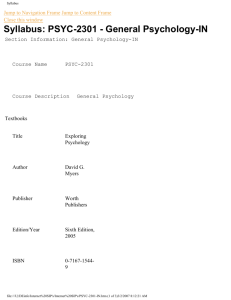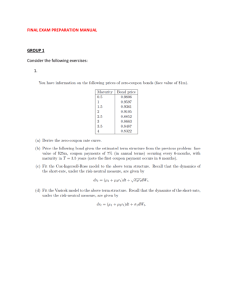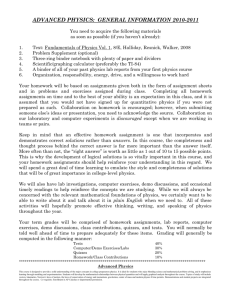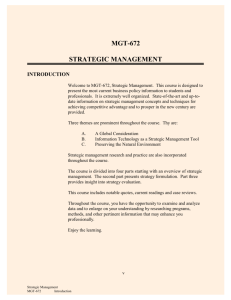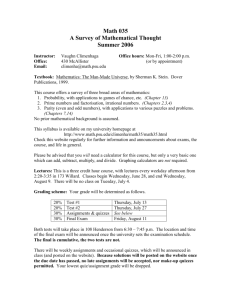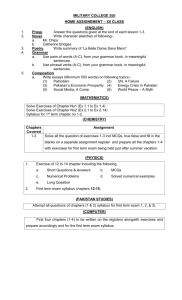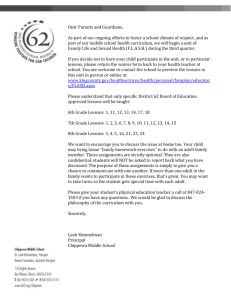BUAD 212 Syllabus Proposed 11-1-10 - NWIC Blogs
advertisement
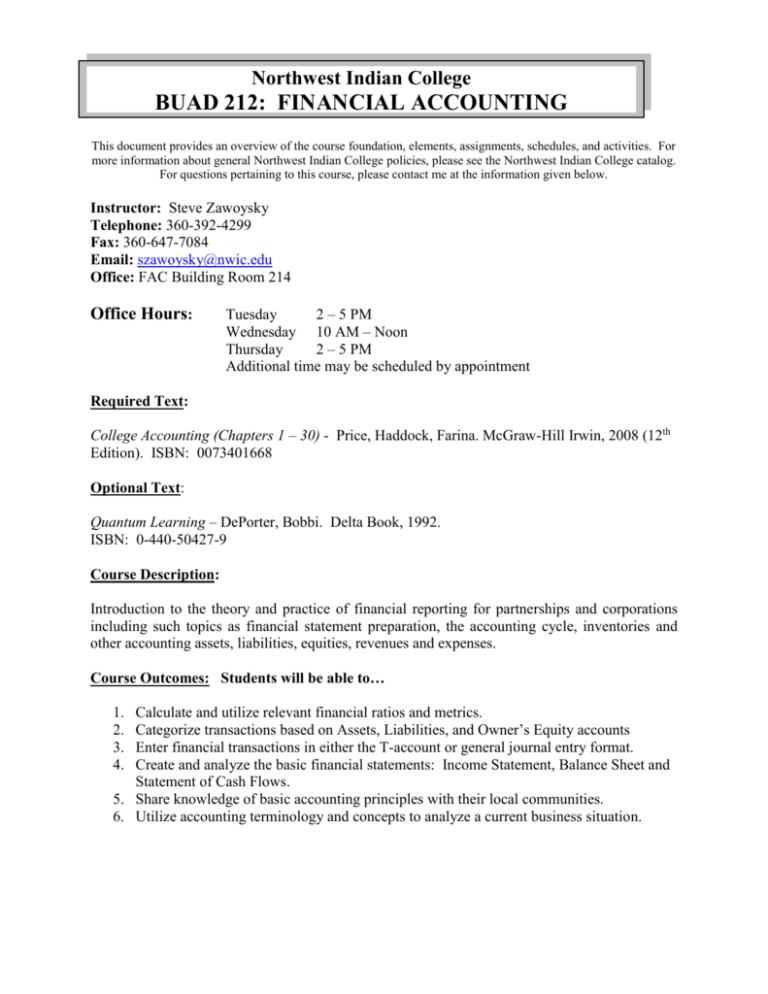
Northwest Indian College BUAD 212: FINANCIAL ACCOUNTING This document provides an overview of the course foundation, elements, assignments, schedules, and activities. For more information about general Northwest Indian College policies, please see the Northwest Indian College catalog. For questions pertaining to this course, please contact me at the information given below. Instructor: Steve Zawoysky Telephone: 360-392-4299 Fax: 360-647-7084 Email: szawoysky@nwic.edu Office: FAC Building Room 214 Office Hours: Tuesday 2 – 5 PM Wednesday 10 AM – Noon Thursday 2 – 5 PM Additional time may be scheduled by appointment Required Text: College Accounting (Chapters 1 – 30) - Price, Haddock, Farina. McGraw-Hill Irwin, 2008 (12th Edition). ISBN: 0073401668 Optional Text: Quantum Learning – DePorter, Bobbi. Delta Book, 1992. ISBN: 0-440-50427-9 Course Description: Introduction to the theory and practice of financial reporting for partnerships and corporations including such topics as financial statement preparation, the accounting cycle, inventories and other accounting assets, liabilities, equities, revenues and expenses. Course Outcomes: Students will be able to… 1. 2. 3. 4. Calculate and utilize relevant financial ratios and metrics. Categorize transactions based on Assets, Liabilities, and Owner’s Equity accounts Enter financial transactions in either the T-account or general journal entry format. Create and analyze the basic financial statements: Income Statement, Balance Sheet and Statement of Cash Flows. 5. Share knowledge of basic accounting principles with their local communities. 6. Utilize accounting terminology and concepts to analyze a current business situation. Evaluation: Attendance Class/Homework Exercises Quizzes Exams (2) Writing Assignments 20% 20% 10% 40% 10% 100% Class Participation/Attendance (20%): Regular attendance and class participation are key tools in learning and retaining the information obtained in this course. Please arrive on time and prepared to discuss the material to be covered for each class session. Both class attendance and in-class participation are evaluated. The use of cell phones and other electronic devices is prohibited while class is in session. Class/Homework Exercises (20%): One of the key components of learning and retaining new information is the regular use and application of it. In an effort to increase retention of the material you are learning, regular exercises will be given to be completed either in class or for the next class period. Completion of these assignments during the class session will allow for group work and the opportunity for assistance from the teacher. It also means you won’t have homework to complete outside of class. Quizzes (10%): Periodic quizzes will be used to assess regular and progressive learning throughout the quarter. Quizzes will cover information that was taught in the previous class sessions or for readings that have been assigned. Prior notice will be given to students so that they are informed of the information required for the quizzes. Exams (40%): Exams will be a combination of short answer, multiple choice, fill in the blank, true and false, and computational questions covering material previously discussed. A short review for the test will occur during the class session immediately prior to the testing date. The first exam will be given around the half-way point of the quarter and the second exam will occur during the last week of the quarter. Writing Assignments (10%): Writing assignments will be given periodically throughout the quarter. Each assignment will have an instruction sheet listing the objectives for the writing and will typically require one to two typed pages. Students who have a valid issue that prevents them from attending class need to notify me prior to the start of that class either via telephone or email. Each situation will be evaluated separately to determine if it is an excused/unexcused absence. If a student has persistent issues attending class, they may be dropped from the class. Regardless of your participation grade, please do your best to attend every class. Learning is a cumulative process and we will build on material covered in previous class sessions. I’ll do my best to keep it relevant, fun, and interesting! Grading Scale: A = 93-100 B+ = 87-89 C+ = 77-79 D+ = 67-69 F = Below 60 A- = 90-92 B = 83-86 C = 73-76 D = 63-66 B- = 80-82 C- = 70-72 D- = 60-62 Course Schedule: The following is the course schedule for BUAD 212. Students will be notified of any changes to this schedule as we proceed through the quarter: SESSION TOPICS AND ASSIGNMENTS Week 1 Course Introduction, Quantum Learning Introduction, Assessment of Personal Learning Styles Week 2 Quantum Learning, Accounting: The Language of Business Exercises: Know Accounting Questions 1-8 READINGS Quantum Learning Handouts Quantum Learning, CA Chapter 1 CA Chapters 2,3 Week 3 Analyzing Business Transactions Analyzing Business Transactions using T Accounts Exercises: 2-3, 2-4, 2-5, Problems 3.1A – 3.4A Week 4 General Journal and the General Ledger Adjustments and the Worksheet Exercises: Problems 4.1 – 4.4, 5.1A – 5.4A CA Chapters 4,5 Accounting for Sales and Accounts Receivable Accounting for Purchases and Accounts Payable Exercises: Problem 7.1A – 7.2A, 8.1A – 8.2A Exam #1 Payroll Computations, Records, and Payment Payroll Taxes, Deposits, and Reports Exercises: Problem 10.1 A – 10.3A, 11.1 -11.3 Accruals, Deferrals, and the Worksheet Financial Statements and Closing Procedures Exercises: 12.1 – 12.4, 13.1 – 13.5 CA Chapters 7 , 8 Week 5 Week 6 Week 7 Week 8 Week 9 Week 10 Accounting Principles and Reporting Standards Accounts Receivable and Uncollectible Amounts Exercises: 14.1 – 14.6, 15.1 – 15.5 CA Chapters 10-11 CA Chapters 12 - 13 CA Chapters 14 - 15 Merchandise Inventory Property, Plant, and Equipment Exercises: 17.1 – 17.4, 18.1 – 18.7 CA Chapters 17-18 Accounting for Partnerships Corporations: Formation and Capital Stock Transactions Exercises: 19.1 – 19.5, 20.1 – 20.5 Exam #2 Enjoy your summer CA Chapters 19 – 20
